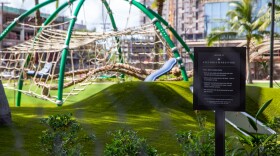This week marks a month since health officials sounded the alarm about detecting avian flu in our wastewater.
The source is believed to be a backyard bird sanctuary in Wahiawā. A timeline released by the state agriculture department shows the situation developing over a short amount of time. It was the first time avian flu was detected on the islands.
After noticing symptoms in her rescued birds, including eye infections and loss of appetite, Susan Wilkinson, the founder of Susie’s Duck Sanctuary, contacted the state for help.
Wilkinson said that she never expected her flock to be Hawaiʻi's first case. Looking back on the events, she said that she noticed the ducks were sleeping a bit more than usual — but didn't see it as concerning since ducks are known to sleep a lot.
"The lack of appetite was immediately noticeable, and they would get like an eye infection ... ducks have that third eyelid in the membrane and it was getting cloudy, and so it went right to their eyes as well. So that was another big sign," she said.
However, Wilkinson didn't realize it was avian flu until a goose named Hector was affected. She said Hector died within two hours of showing symptoms.
"Originally, we thought it was just we had a lot of rain. We thought it was pesticides or some kind of a poisoning in the yard, accidental. When it got to inside then we're like, okay, this is an airborne virus as well, or a transferable virus that could have been on a person moving inside the house," she said.
Wilkinson called for volunteers to help get answers about what was happening to her rescue flock. She also was trying to set everything up for the volunteers to take over while she went on her vacation, which she ended up canceling due to the virus.
When she eventually got ahold of the state for help with her flock after Veterans Day weekend, 17 birds had already died.
"I had preserved the bodies properly, and they asked to bring them in so they could do a necropsy, which is an animal autopsy, and did testing on those and then once those results came in, that was when they said they had been infected," Wilkinson said.
After confirming that the birds contracted avian flu, the flock was euthanized as a precaution.
"I don't think people understood — they thought I was raising them or breeding them or they were just some fun ones. But no, every one of them was a life that had been saved from one thing or another — whether it was an injury, an accident, dumped or surrendered. But they'd all been rescued and saved and healed and were looking for forever homes and were recovering. So it was even more tragic because I felt like I failed some in the end after I tried really hard," she told HPR.
Wilkinson said she believes that a lot of people aren't reporting cases — as they believe their birds passed due to poisoning of some sort.
"By being more proactive, I think that will help everybody. I know it's terrifying because you get scared and you don't know who to trust, but I think that just being open about it will definitely help in the long run, and everybody working together to help find ways to help protect your own flock is the best thing we can do," she said.
Those who work at Susie's Duck Sanctuary tested negative for the virus. However, Wilkinson emphasized that avian flu is a real threat.
"I don't want to scare people. I'm not trying to be a fearmonger. I just want to spread awareness and just again, being proactive, just to give us some kind of an opportunity to help fight this," she said.
This interview aired on The Conversation on Dec. 10, 2024. The Conversation airs weekdays at 11 a.m. on HPR-1.






